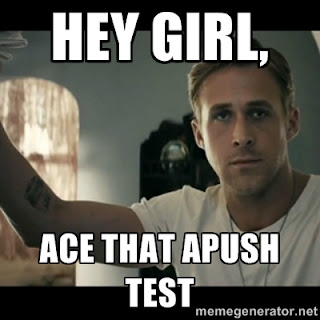Link to survey regarding the class - Please complete the survey to give me feedback that I can use in the future.
AP Movie Survey
Link to Group Project Guidelines
Link to Group Peer Evaluations
This is the blog page for Mr. Jensen's AP US History Class at Draughn High School in Valdese, NC. Students should bookmark this site to be able to access it on a regular basis.
Monday, May 14, 2018
Monday, April 30, 2018
4-30-18 Review Resources
What do I need to score to pass? a score calculator/predictor

Link to AP Central - All you need to know about the exam with samples and rubrics - VERY USEFUL!!

Link to Curriculum Framework. All info from "white areas" begins on page 21.
Khan Academy Resources to prepare for the AP Exam

Excellent resource from Gilder Lehrman to prepare for your exam - Watch these videos!
Website from a school in California
-Great links to cover content eras - pdf files
Links to previous essay questions with responses and response explanations
www.mrklaff.comhttp://mrklaff.com/apfinalreview.html Great APUSH Review
Link to APUSH Review Book (Very Good)

Link to a website with MANY Review Quizzes (A great way to pass the time!)
How to write an APUSH DBQ Response (Take notes on this)

Same as above but much longer - The Experts on how to write a DQB response
Time Periods and Themes in APUSH - Great Reference

Practice Exam
Free Response Practice

Link to AP Central - All you need to know about the exam with samples and rubrics - VERY USEFUL!!

Link to Curriculum Framework. All info from "white areas" begins on page 21.
Khan Academy Resources to prepare for the AP Exam

Excellent resource from Gilder Lehrman to prepare for your exam - Watch these videos!
Website from a school in California
-Great links to cover content eras - pdf files
Links to previous essay questions with responses and response explanations
www.mrklaff.comhttp://mrklaff.com/apfinalreview.html Great APUSH Review
Link to APUSH Review Book (Very Good)
Link to a website with MANY Review Quizzes (A great way to pass the time!)
How to write an APUSH DBQ Response (Take notes on this)

Same as above but much longer - The Experts on how to write a DQB response
Time Periods and Themes in APUSH - Great Reference

Practice Exam
Free Response Practice
Thursday, March 15, 2018
Friday, February 23, 2018
Friday, February 16, 2018
Friday 2-16-18 Chapter 9: Confederation & Constitution
Chapter 9 Key Terms:
Virginia Statute of Religious Freedom 1786
First Anti-Slavery Society - Quakers in Philadelphia 1755
Civic Virtue:
Republican Motherhood:
Articles of Confederation 1781-1787:
"The Critical Period":
Land Ordinance of 1785:
Northwest Ordinance of 1787:
Shays' Rebellion:
Annapolis Convention 1787:
Constitutional Convention:
Virginia Plan:
New Jersey Plan:
"Great Compromise":
3/5 Compromise:
Commerce & Slave Trade Compromise:
Federalism:
Ratification:
Federalists & Anti-Federalists:
Federalist Papers:
Virginia Statute of Religious Freedom 1786
First Anti-Slavery Society - Quakers in Philadelphia 1755
Civic Virtue:
Republican Motherhood:
Articles of Confederation 1781-1787:
"The Critical Period":
Land Ordinance of 1785:
Northwest Ordinance of 1787:
Shays' Rebellion:
Annapolis Convention 1787:
Constitutional Convention:
Virginia Plan:
New Jersey Plan:
"Great Compromise":
3/5 Compromise:
Commerce & Slave Trade Compromise:
Federalism:
Ratification:
Federalists & Anti-Federalists:
Federalist Papers:
Tuesday, February 6, 2018
Monday, February 5, 2018
Wednesday, January 31, 2018
Wednesday 1-31-18
Link to Practice AP Questions on Period 1
Questions for Class Discussion - Chapter 2
Link to American Pageant - Chapter 2
Key Terms - Chapter 3:
Puritan Separatists
*Mayflower Compact
-Plymouth Bay - William Bradford
-Massachusetts Bay - John Winthrop
*Great Migration
Puritan Dissenters:
*Anne Hutchinson
*Roger Williams
-Rhode Island
-"Separation of Church and State"
Thomas Hooker
*Fundamental Orders of Connecticut
Puritans v. Indians
-Pequot War
*King Philip's War
*New England Confederation
*Dominion of New England
-Reinforce *Navigation Acts
-Sir Edmund Andros
*Glorious Revolution
-*English Bill of Rights
-*Salutary Neglect
Dutch in America
Quakers
-*William Penn
Questions for Class Discussion - Chapter 2
Link to American Pageant - Chapter 2
1. What did England and the English settlers really want from colonization? Did they want national glory, wealth, adventure, a solution to social tensions, and/or new sources of goods and trade? Did they get what they wanted?
2. How did Spanish success in the New World influence the English colonial efforts? How did England’s earlier experience in Ireland influence its colonial efforts in the New World? How did different events in England (and Europe) affect England’s southern colonies in the New World?
3. Were the English colonizers crueler or more tolerant than the Spanish conquistadores? Why did the Spanish tend to settle and intermarry with the Indian population, whereas the English killed the Indians, drove them out, or confined them to separate territories? How did this pattern of interaction affect both white and Indian societies?
4. Was the development of enslaved Africans in the North American colonies inevitable? (Consider that it never developed in some other colonial areas, for example, Mexico and New France.) How would the North American colonies have been different without slavery? What role did the Spanish encomienda system and British sugar colonies play in introducing slavery to the southern colonies?
5. Why did Carolina
North Carolina
In what ways was Georgia
6. It is sometimes suggested that the Iroquois Confederacy may have provided a model for the union of states into the United States of America. What similarities and differences are there between the two confederations?
7. What role did the Iroquois play in the politics and warfare of British North America? Was the decision of most Iroquois to side with the British in the Revolutionary War the most decisive moment in their history? Why or why not?
Questions for Class Discussion - Chapter 3
1. Did the Puritans really come to America seeking religious freedom? How did they reconcile their own religious dissent from the Church of England with their persecution of dissenters like Hutchinson and Williams? Does their outlook make them hypocrites?
2. How were government and religion—or church and state—related in New England and the middle colonies? How does the colonial view of these matters compare with more recent understandings?
3. Was an American Revolution, separating the colonies from England, inevitable after the Glorious Revolution had encouraged colonists to end the Dominion of New England, England’s serious attempt at enforcing royal authority? Did England’s “salutary neglect” contribute to future problems in its empire? How might have England been able to successfully enforce its rule on the colonies without causing rebellion?
4. Dutch colonization efforts in New Amsterdam most closely resembled English colonization efforts in which region: New England, the middle colonies, or the southern colonies? The Dutch had a powerful presence in the East Indies, so why were the Dutch less successful in the West Indies and North America? What is the lasting influence of the Dutch in English North America?
5. How does the founding of the New England colonies compare with the origin of the middle colonies? In what ways were New England and the middle colonies each like the South, and in what ways were they different?
6. In what ways were the middle colonies more open and diverse than New England? In what ways were they less democratic?
7. How did different events in England affect the New England and middle colonies in the New World? Which was the most affected and least affected by events in the Old World: New England, middle colonies, or southern colonies?
8. What were the push and pull factors for immigrants coming to each region of English colonies (New England, the middle colonies, and the southern colonies)?
Puritan Separatists
*Mayflower Compact
-Plymouth Bay - William Bradford
-Massachusetts Bay - John Winthrop
*Great Migration
Puritan Dissenters:
*Anne Hutchinson
*Roger Williams
-Rhode Island
-"Separation of Church and State"
Thomas Hooker
*Fundamental Orders of Connecticut
Puritans v. Indians
-Pequot War
*King Philip's War
*New England Confederation
*Dominion of New England
-Reinforce *Navigation Acts
-Sir Edmund Andros
*Glorious Revolution
-*English Bill of Rights
-*Salutary Neglect
Dutch in America
Quakers
-*William Penn
Monday, January 29, 2018
Monday 1-29-18
New World Encounters/The Beginning of America Video
Link to Quizlet signup for AP US History Class
Link to American Pageant Chapter 2
American Pageant Chapter 1 & 2 Review (Really good!)
American Pageant Chapter 2 Summary mp3 File
Key Terms from Chapter 2:
Protestant Reformation (effects of):
The Lost Colony:
Defeat of the Spanish Armada:
Push Factors in England:
-Enclosure
-Primogeniture
Joint-Stock Companies:
(Virginia Company of London)
Jamestown:
John Smith:
"Starving Time":
Lord De La Warr:
Anglo-Powhatan Wars:
John Rolfe:
House of Burgesses:
Indentured Servants:
Maryland's Act of Toleration:
West Indies' Sugar Trade:
Slave Codes:
Iroquois Confederacy:
APUSH Review Period 1 - Must watch to tie it all together!
Link to Quizlet signup for AP US History Class
Link to American Pageant Chapter 2
American Pageant Chapter 1 & 2 Review (Really good!)
American Pageant Chapter 2 Summary mp3 File
Key Terms from Chapter 2:
Protestant Reformation (effects of):
The Lost Colony:
Defeat of the Spanish Armada:
Push Factors in England:
-Enclosure
-Primogeniture
Joint-Stock Companies:
(Virginia Company of London)
Jamestown:
John Smith:
"Starving Time":
Lord De La Warr:
Anglo-Powhatan Wars:
John Rolfe:
House of Burgesses:
Indentured Servants:
Maryland's Act of Toleration:
West Indies' Sugar Trade:
Slave Codes:
Iroquois Confederacy:
APUSH Review Period 1 - Must watch to tie it all together!
Thursday, January 18, 2018
AP US History Day 1
Hello and welcome to the blog of Mr. Jensen's AP US History Class. You will need to bookmark this page to be able to access it for important assignments and other notifications.
APUSHreview.com
Student Information Form
AP US History Syllabus
Link to sign up with Remind
Where do you stand politically?
APUSHreview.com
Student Information Form
AP US History Syllabus
Link to sign up with Remind
Where do you stand politically?
Be prepared to discuss the answers that preface the article.
Read pages 13-23 in American Pageant.
Key Terms:
Columbian Exchange
Microbes vs. Muskets
Conquistadores
Bartolome de Las Casas
Encomienda System
Pope's Rebellion
"Black Legend"
3 Sister Farming
Questions for Class Discussion
1. How did Indian societies of South and North America differ from European societies at the time the two came into contact? In what ways did Indians retain a worldview different from that of the Europeans?
2. What role did disease and forced labor (including slavery) play in the early settlement of America? Is the view of the Spanish and Portuguese as especially harsh conquerors and exploiters valid—or is this image just another version of the English black legend concerning the Spanish role in the Americas?
3. Are the differences between Latin America and North America due primarily to the differences between the respective Indian societies that existed in the two places, or to the disparity between Spanish and English culture? What would have happened if the English had conquered densely settled Mexico and Peru, and the Spanish had settled more thinly populated North America?
4. In what ways are the early (pre-1600) histories of Mexican and the present-day American Southwest understood differently now that the United States is being so substantially affected by Mexican and Latin American immigration and culture? To what extent should this now be regarded as part of our American history?
5. Why was the Old World able to dominate the New World? What were the strengths and weaknesses of the Old World? What were the strengths and weaknesses of the New World?
Questions for Class Discussion
1. Should the Spanish conquistadores be especially blamed for the cruelties and deaths (including those by disease) inflicted on the original Indian populations of the Americas? Is it possible to make such criticisms without falling into the traditional English fallacies of the black legend?
2. What is the long-term significance for Latin America of the immortality achieved by the conquistadores through intermarriage with Indian women?
https://medium.com/@dinachka82/about-your-poem-1f26a7585a6f#.zafk1ikzx
Subscribe to:
Comments (Atom)
